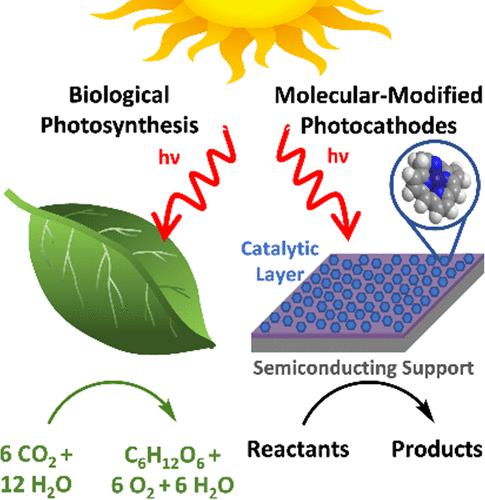当前位置:
X-MOL 学术
›
Chem. Rev.
›
论文详情
Our official English website, www.x-mol.net, welcomes your
feedback! (Note: you will need to create a separate account there.)
Molecular-Modified Photocathodes for Applications in Artificial Photosynthesis and Solar-to-Fuel Technologies
Chemical Reviews ( IF 51.4 ) Pub Date : 2022-09-29 , DOI: 10.1021/acs.chemrev.2c00200 Edgar A Reyes Cruz 1 , Daiki Nishiori 1 , Brian L Wadsworth 1 , Nghi P Nguyen 1 , Lillian K Hensleigh 1 , Diana Khusnutdinova 1 , Anna M Beiler 1 , G F Moore 1
Chemical Reviews ( IF 51.4 ) Pub Date : 2022-09-29 , DOI: 10.1021/acs.chemrev.2c00200 Edgar A Reyes Cruz 1 , Daiki Nishiori 1 , Brian L Wadsworth 1 , Nghi P Nguyen 1 , Lillian K Hensleigh 1 , Diana Khusnutdinova 1 , Anna M Beiler 1 , G F Moore 1
Affiliation

|
Nature offers inspiration for developing technologies that integrate the capture, conversion, and storage of solar energy. In this review article, we highlight principles of natural photosynthesis and artificial photosynthesis, drawing comparisons between solar energy transduction in biology and emerging solar-to-fuel technologies. Key features of the biological approach include use of earth-abundant elements and molecular interfaces for driving photoinduced charge separation reactions that power chemical transformations at global scales. For the artificial systems described in this review, emphasis is placed on advancements involving hybrid photocathodes that power fuel-forming reactions using molecular catalysts interfaced with visible-light-absorbing semiconductors.
中文翻译:

分子修饰光电阴极在人工光合作用和太阳能燃料技术中的应用
大自然为开发集太阳能捕获、转换和存储于一体的技术提供了灵感。在这篇评论文章中,我们强调了自然光合作用和人工光合作用的原理,比较了生物学中的太阳能转换和新兴的太阳能燃料技术。生物学方法的主要特征包括使用地球上丰富的元素和分子界面来驱动光诱导电荷分离反应,从而在全球范围内为化学转化提供动力。对于本综述中描述的人工系统,重点放在涉及混合光电阴极的进步,该混合光电阴极使用与可见光吸收半导体接口的分子催化剂为燃料形成反应提供动力。
更新日期:2022-09-29
中文翻译:

分子修饰光电阴极在人工光合作用和太阳能燃料技术中的应用
大自然为开发集太阳能捕获、转换和存储于一体的技术提供了灵感。在这篇评论文章中,我们强调了自然光合作用和人工光合作用的原理,比较了生物学中的太阳能转换和新兴的太阳能燃料技术。生物学方法的主要特征包括使用地球上丰富的元素和分子界面来驱动光诱导电荷分离反应,从而在全球范围内为化学转化提供动力。对于本综述中描述的人工系统,重点放在涉及混合光电阴极的进步,该混合光电阴极使用与可见光吸收半导体接口的分子催化剂为燃料形成反应提供动力。































 京公网安备 11010802027423号
京公网安备 11010802027423号